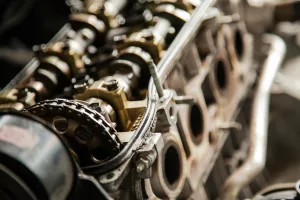Experiencing your car stalling unexpectedly while driving can be both frustrating and dangerous. Stalling is when your engine suddenly shuts off, leaving you without power steering, brakes, and potentially in a hazardous situation. There are various reasons why your car might stall, ranging from minor issues to serious mechanical problems. In this article, we’ll explore the common causes of random stalling and what you can do to fix them.
1. Fuel System Issues
One of the most common causes of stalling is a problem with the fuel system. Your engine needs a constant supply of fuel to run smoothly, and any disruption in this system can cause the engine to shut down.
Fuel Pump Problems
The fuel pump is responsible for delivering fuel from the gas tank to the engine. If the pump is failing, it may not be able to supply enough fuel, causing the engine to stall. This is especially noticeable when accelerating or driving uphill.
Example: Consider a scenario where you notice your car hesitating or sputtering during acceleration. This could be an early sign of a failing fuel pump. If left unchecked, it could lead to complete stalling, especially in demanding driving conditions like climbing a steep hill.
Tip: Regularly check the fuel pump’s functionality as part of routine maintenance. Listen for unusual noises from the fuel pump, especially when the ignition is first turned on, as these can be early indicators of a problem.
Clogged Fuel Filter
The fuel filter removes impurities from the fuel before it reaches the engine. Over time, the filter can become clogged, restricting the flow of fuel and causing the engine to stall.
Example: Imagine driving and suddenly experiencing a loss of power, with the car eventually stalling. This could be due to a clogged fuel filter not allowing enough fuel to reach the engine.
Tip: Replace the fuel filter according to your vehicle manufacturer’s recommended schedule, typically every 20,000 to 40,000 miles, to prevent such issues.
Faulty Fuel Injectors
If the fuel injectors are dirty or malfunctioning, they may not deliver the correct amount of fuel to the engine, leading to random stalling.
Example: A common symptom of faulty injectors is rough idling or stalling after starting the car. This happens because the injectors aren’t able to maintain the necessary fuel flow.
Tip: Use high-quality fuel and consider periodic fuel system cleaning to help maintain injector performance.
What to Do: If you suspect a fuel system issue, have your vehicle inspected by a mechanic. Replacing a clogged fuel filter, repairing a fuel pump, or cleaning the fuel injectors can resolve the problem.
2. Ignition System Problems
The ignition system is responsible for igniting the air-fuel mixture in the engine. If there’s an issue with any part of this system, your car might stall while driving.
Faulty Spark Plugs
Worn or fouled spark plugs can cause misfires, leading to stalling. The engine may struggle to stay running if the spark plugs aren’t delivering the necessary spark.
Example: You might notice your car having difficulty starting or experiencing a sudden loss of power while driving, which could be traced back to faulty spark plugs.
Tip: Regularly inspect and replace spark plugs as per your vehicle’s maintenance schedule, which is generally every 30,000 to 100,000 miles, depending on the type of plugs used.
Bad Ignition Coils
Ignition coils convert the battery’s voltage into the high voltage needed to create a spark in the spark plugs. If a coil is failing, it can cause intermittent stalling, especially when accelerating or under load.
Example: A car that stalls or runs roughly during acceleration may be suffering from a faulty ignition coil. This can occur when the coil fails to deliver adequate power to the spark plugs.
Tip: If you notice any signs of a misfire, such as a rough idle or hesitation during acceleration, have the ignition coils checked.
Distributor Problems (in Older Vehicles)
If your car has a distributor, worn contacts or a faulty rotor can disrupt the ignition timing, causing random stalling.
Example: Older vehicles may experience stalling or rough running, which can often be traced back to distributor issues such as worn points or a failing rotor.
Tip: Regular maintenance and timely replacement of distributor components can prevent these issues.
What to Do: Regular maintenance, such as replacing spark plugs and ignition coils as needed, can help prevent stalling related to ignition system issues. Have a mechanic diagnose and repair any problems with the ignition system.
3. Air Intake and Vacuum Leaks
Your engine requires a precise balance of air and fuel to run smoothly. If there’s an issue with the air intake system or a vacuum leak, it can disrupt this balance and cause the engine to stall.
Dirty or Faulty Mass Air Flow (MAF) Sensor
The MAF sensor measures the amount of air entering the engine and helps adjust the fuel mixture. A dirty or malfunctioning MAF sensor can cause stalling by sending incorrect data to the engine control unit (ECU).
Example: A faulty MAF sensor might lead to symptoms like poor acceleration, rough idling, or stalling, especially when the engine is cold.
Tip: Clean the MAF sensor with appropriate cleaner as part of regular maintenance to avoid build-up that can affect sensor performance.
Vacuum Leaks
The engine relies on a network of vacuum hoses for various functions. A cracked or loose hose can cause a vacuum leak, leading to an inconsistent air-fuel mixture and causing the engine to stall, especially at idle.
Example: You might hear a hissing noise from the engine bay, indicating a vacuum leak. This can result in stalling, particularly at stoplights or when idling.
Tip: Regularly inspect vacuum hoses for signs of wear or damage. Replacing old hoses can prevent leaks and associated problems.
What to Do: Have the air intake system and vacuum lines checked for leaks or blockages. Cleaning or replacing the MAF sensor and fixing any vacuum leaks can restore normal engine function.
4. Electrical System Issues
The electrical system plays a crucial role in keeping your engine running. A problem with the electrical components can lead to stalling, especially if the power to key systems is interrupted.
Failing Alternator
The alternator charges the battery and powers the electrical systems while the engine is running. A failing alternator may not provide enough power, causing the engine to stall, especially if multiple electrical components (like headlights, radio, and AC) are in use.
Example: If your headlights dim or your dashboard lights flicker while driving, it could be a sign of a failing alternator.
Tip: Have your alternator output tested periodically, especially if the vehicle is older or shows symptoms of electrical failure.
Weak Battery
If your battery is old or weak, it might not hold a sufficient charge, leading to intermittent power loss and causing the engine to stall.
Example: A weak battery might cause the car to stall shortly after starting, as it struggles to maintain enough voltage to power the ignition system.
Tip: Replace your battery every 3-5 years to ensure reliable performance, and keep terminals clean to ensure good electrical connections.
Faulty Wiring or Connections
Loose or corroded electrical connections can cause intermittent power loss to critical components, resulting in random stalling.
Example: Corroded battery terminals can interrupt the flow of electricity, potentially leading to stalling when the demand on the electrical system is high.
Tip: Regularly inspect and clean battery terminals and check wiring for signs of corrosion or damage.
What to Do: If you suspect an electrical issue, have your battery, alternator, and wiring inspected by a professional. Replacing a weak battery, repairing faulty wiring, or replacing a failing alternator can resolve stalling problems.
5. Engine Control Unit (ECU) Problems
The ECU is the brain of your car, controlling everything from fuel injection to ignition timing. If the ECU is malfunctioning or receiving faulty signals, it can cause the engine to stall.
Software Glitches
Sometimes, software issues within the ECU can cause stalling, especially if there are conflicting signals or corrupted data.
Example: A car that stalls intermittently without any apparent mechanical issues might be experiencing an ECU software glitch.
Tip: Regular updates or reprogramming of the ECU, as recommended by your vehicle manufacturer, can prevent software-related issues.
Faulty Sensors
The ECU relies on input from various sensors (such as the oxygen sensor, throttle position sensor, and crankshaft position sensor) to manage engine performance. A failing sensor can send incorrect data, leading to stalling.
Example: A faulty crankshaft position sensor might cause the engine to stall randomly, as it fails to provide accurate engine speed data to the ECU.
Tip: Regular diagnostic scans can help identify failing sensors before they cause significant issues.
What to Do: If you suspect an ECU issue, a mechanic can run diagnostic tests to identify faulty sensors or software issues. Replacing a bad sensor or reprogramming the ECU can often fix the problem.
6. Transmission and Clutch Issues
Transmission or clutch problems can cause stalling, especially in manual transmission vehicles. If the transmission is struggling to shift properly or the clutch is slipping, the engine may stall.
Stalling When Shifting Gears
In manual cars, if you release the clutch too quickly without giving enough throttle, the engine can stall. Similarly, a worn clutch can cause slipping, leading to stalling.
Example: If your car stalls when you come to a stop or shift into first gear, it could be due to improper clutch operation or a worn clutch.
Tip: Practice smooth clutch engagement and consider having the clutch inspected if you notice slipping or difficulty changing gears.
Automatic Transmission Issues
In automatic cars, a faulty torque converter or transmission solenoid can cause the car to stall while driving or when coming to a stop.
Example: An automatic vehicle that shudders or stalls when coming to a stop might have a torque converter issue.
Tip: Have the transmission fluid and components inspected regularly to prevent issues from developing.
What to Do: If your car stalls during gear shifts or while coming to a stop, have the transmission and clutch inspected. Repairs or adjustments to the clutch, torque converter, or transmission components can resolve the issue.
7. Overheating Engine
An overheating engine can lead to stalling, as it can cause the engine to seize or the ECU to shut down the engine to prevent damage.
Causes of Overheating:
- Low Coolant Levels: If the coolant level is too low, it can’t effectively cool the engine.
- Faulty Thermostat: A thermostat stuck in the closed position can prevent coolant from circulating.
- Radiator Issues: Blockages or leaks in the radiator can reduce cooling efficiency.
Example: If your temperature gauge rises rapidly and the car stalls, overheating may be the culprit.
Tip: Regularly check coolant levels and inspect the radiator and thermostat for proper operation.
What to Do: Addressing overheating requires immediate attention. Refill coolant, replace a faulty thermostat, or repair radiator issues to prevent further damage.
8. Emission Control System Problems
The emission control system, including components like the EGR valve and catalytic converter, plays a crucial role in reducing vehicle emissions. Problems here can lead to stalling.
Faulty EGR Valve
The Exhaust Gas Recirculation (EGR) valve helps reduce emissions by recirculating a portion of the exhaust back into the engine cylinders. If it becomes stuck open, it can cause rough idling and stalling.
Example: A vehicle that stalls or idles roughly, especially after warming up, may have a stuck EGR valve.
Tip: Regular cleaning of the EGR valve can prevent carbon build-up and ensure it operates smoothly.
Clogged Catalytic Converter
A clogged catalytic converter can restrict exhaust flow, leading to reduced engine performance and stalling.
Example: If your car loses power going uphill or stalls after running for a while, a clogged catalytic converter might be to blame.
Tip: Address engine misfires and exhaust leaks promptly to prevent damage to the catalytic converter.
What to Do: If you suspect issues with the emission system, have the EGR valve and catalytic converter checked by a professional. Cleaning or replacing these components can restore normal operation.
Common Mistakes and How to Avoid Them
- Ignoring Warning Signs: Many stalling issues can be predicted by early warning signs like unusual noises, poor performance, or dashboard warning lights. Address these signs promptly.
- Skipping Regular Maintenance: Regular maintenance is crucial for preventing stalling. This includes timely oil changes, filter replacements, and checking fluid levels.
- DIY Repairs Without Proper Knowledge: While DIY repairs can save money, they can also lead to further issues if not done correctly. Always consult a professional for complex problems.
Additional Practical Tips
- Keep a Log: Document when and under what conditions your car stalls. This information can help mechanics diagnose the problem more efficiently.
- Emergency Preparedness: Know what to do if your car stalls in traffic. Safely steer to the side of the road, turn on hazard lights, and call for assistance if needed.
- Invest in a Diagnostic Tool: A basic OBD-II scanner can help identify trouble codes, providing insight into potential issues before they lead to stalling.
By understanding the various reasons why a car might stall and taking proactive measures, you can minimize the risk and ensure that your vehicle remains reliable on the road. Regular maintenance and prompt attention to minor issues can prevent them from becoming major problems down the line.




